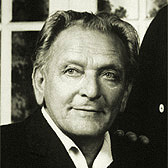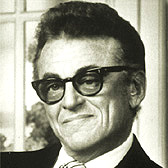
With partner Alan Jay Lerner a Broadway powerhouse
Frederick Loewe
InducteeAdapted European operetta tradition for American musical theater
Frederick Loewe was born in Vienna, Austria on June 10, 1901, and from the beginning was steeped in the Viennese musical style. His father was a popular operetta star, and when The Merry Widow arrived in Berlin, Loewe's father was Berlin's first Danilo. By the age of 15, "Fritz" had composed a hit popular song, "Katrina", and was getting considerable attention as a promising young piano virtuoso. Like the young Kurt Weill, who was one year his senior, Loewe studied in Berlin with the great Italian-German composer and pianist Ferruccio Busoni. He also studied with the pianist-composer Eugen d'Albert and the composer Emil von Rezniek. At this time, his great ambition was to become a famous concert pianist and he traveled to the United States in 1924. Unfortunately, success did not greet him in America, and in the years that followed he survived by taking a colorful variety of jobs. At one time he was a cowboy, and at another time a prizefighter.
Meanwhile, Loewe worked to master the American style in popular music. In 1937, his first try at an American Musical Production opened in St. Louis called Salute to Spring. Then in 1938 he teamed up with lyricist Earle Crooker and in in his first Broadway Production called Great Lady. After several more attempts at a successful musical had failed, he met the Alan Jay Lerner, seventeen years his junior, and from that time, although Loewe worked with only Lerner.
Lerner and Loewe first met in 1942 and their first collaborations were failures The Life of the Party (1942) and What's Up? (1943). Their next, The Day Before Spring (1945) did slightly better, and included the song "You Haven't Changed At All". In 1947 they had their first hit, Brigadoon, which included "The Heather On the Hill" and the classic romantic ballad "Almost Like Being In Love". In 1951 Lerner and Loewe had their second success with Paint Your Wagon, which included such songs as "They Call The Wind Maria", "I Talk to the Trees", and "Wandrin' Star".
Then in 1956 the revolutionary Broadway Production, My Fair Lady, premiered on Broadway starring Julie Andrews and Rex Harrington. Loewe’s astonishingly rich score, one of the great masterpieces of the American musical, included the now standard "Why Can't The English?", "Wouldn't It Be Loverly", "With a Little Bit Of Luck", "I'm an Ordinary Man", "Just You Wait", "The Rain in Spain", "I Could Have Danced All Night", "On the Street Where You Live", "You Did It", "Show Me", "Get Me to the Church On Time", "A Hymn to Him" and "I've Grown Accustomed to Her Face". The show ran for 2,717 performances in its original Broadway production.
My Fair Lady was followed in 1958 with the classic film musical Gigi, which had a superb score including "Thank Heaven For Little Girls" and "I Remember it Well". The Film Musical won 9 Academy Awards.
In their last great collaboration, Lerner and Loewe created the 1960 score for Camelot, which included songs "I Wonder What the King is Doing Tonight", "Camelot", "The Simple Joys Of Maidenhood", "How to Handle a Woman", and "If Ever I Should Leave You".
After Camelot, Loewe, now 60 years old, withdrew from composing, although he did return to work together with Lerner one last time on the unsuccessful 1974 film The Little Prince. Loewe's music springs from the European operetta tradition, but he adapted that tradition to appeal to an American audience with complete success. Although each of his classic shows is in a unique style reflecting the period and location of the story, each of them remains un-mistakably the work of Frederick Loewe. Frederick Loewe died in Palm Springs, California on February 14, 1988.


